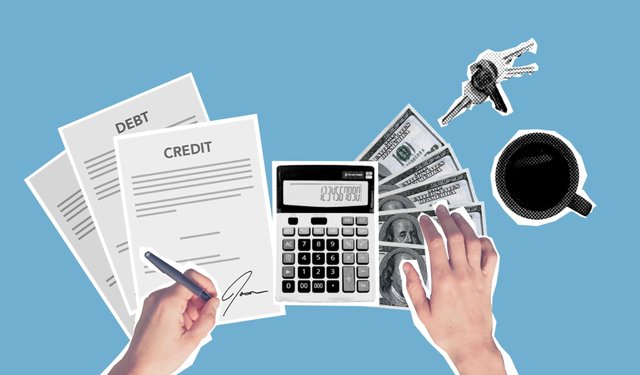
IMAGE CREDIT PIXELS.COM
For many individuals, being in debt is an unfortunate reality. It can be difficult to handle all of the debt, from credit card debt to student loans. It's crucial to keep in mind though that debt doesn't have to rule your existence. You can take charge of your financial circumstances and work towards a debt-free future with effective debt management.
Recognizing Your Debt.
It's crucial to know precisely what you owe before you start managing your debt. Spend some time gathering all of your financial records and making a debt inventory. The overall amount owed, the interest rate, and the minimum payment needed each month should all be listed here.
You can start prioritizing your debt once you have a clear grasp of it. It might be necessary to deal with some debts first, such as those with large interest rates. Others might allow for longer repayment terms and more flexible payment choices. It's crucial to develop a strategy that accommodates your particular financial situation.
Creating a Budget.
Making a budget is one of the key components of debt control. You can use this to find areas where you can reduce spending and put more money towards paying off your debt. Calculate your overall income as well as your essential spending, such as your rent, utilities, and food. Next, decide where you can make cuts, such as in amusement or eating out.
You can make a plan for paying off your debt once you have a clear grasp of your income and expenses. Decide how much you can reasonably afford to set aside each month to pay off debt, and then allocate that money appropriately. To prevent taking on more debt, it's critical to adhere to your budget.

IMAGE CREDIT PIXELS.COM
A Debt Consolidation Plan.
Debt consolidation might be a good choice if you have several high-interest obligations. This entails obtaining a loan to pay off all of your current obligations and combining them into a single, lower-interest-rate payment each month. This can help you organize your money and make managing your debt simpler.
It's crucial to keep in mind though that debt restructuring is not a quick fix. It might not be the best choice for everyone, so you should think it over thoroughly before accepting the loan's terms. Make sure you are aware of the interest rate, the time frame for payback, and any additional costs.
Discussions with creditors.
It might be worthwhile to contact your creditors to go over your choices if you're having trouble making your debt payments. Many lenders are open to collaborating with you to develop a payback strategy that suits your financial circumstances. This could entail lowering your interest rate, expanding the time frame for repayment, or waiving some of your debt.
When discussing your financial position with your creditors, it's critical to be open and honest. Tell them about your struggles and give them a detailed outline of your debt repayment strategy. You might be able to come up with an answer that benefits both of you by working together.

IMAGE CREDIT PIXELS.COM
Continued Motivation.
Although managing debt can be a protracted and challenging process, it's critical to maintain motivation. Celebrate incremental victories, like paying off a credit card or achieving a debt reduction goal. Remind yourself of your long-term financial objectives and the reasons you are working so hard to pay off your debt.
Additionally, look for assistance from loved ones, friends, or money experts. Having someone to hold you responsible and encourage you along the road can be beneficial.
Final Reflections.
Although managing your debt can be difficult, it's essential to keep in mind that you're not doing it alone. You can gain control over your finances by being aware of your debt, making a budget, and looking into your choices for debt negotiation and consolidation. Keep yourself inspired and committed to your long-term objectives, and don't be afraid to ask for help when you need it. You can attain money freedom and debt freedom with effort and commitment.
KOREAN
부채는 많은 사람들에게 불행한 현실입니다. 학생 대출부터 신용카드 부채까지, 부채를 관리하는 것은 압도적으로 느껴질 수 있습니다. 그러나 부채가 인생을 지배하지 않아도 된다는 것을 기억하는 것이 중요합니다. 적절한 부채 관리를 통해, 당신은 자신의 재정 상황을 통제하고 무부채 생활을 향해 나아갈 수 있습니다.
부채 이해하기
부채를 관리하기 전에, 당신이 무엇을 빚지고 있는지 정확히 이해하는 것이 중요합니다. 시간을 내어 모든 재무 문서를 모아 부채 목록을 작성하세요. 이것은 총 빚지는 금액, 이자율 및 매월 지불해야 하는 최소 금액을 포함해야 합니다.
부채의 우선순위를 정하는 것부터 시작해서, 고금리 등의 부채는 먼저 해결해야 할 수도 있습니다. 다른 부채는 더 유연한 지불 옵션을 가지고 있으며 더 오랜 기간 동안 상환할 수 있습니다. 자신의 독특한 재정 상황에 맞는 계획을 만드는 것이 중요합니다.
예산 작성하기
부채 관리에서 가장 중요한 측면 중 하나는 예산을 작성하는 것입니다. 이를 통해 지출을 줄일 수 있는 분야를 식별하고 부채 상환에 더 많은 돈을 할당할 수 있습니다. 먼저 총 수입과 임대료, 유틸리티 및 식비와 같은 필수 지출을 계산하세요. 그런 다음, 엔터테인먼트나 외식 등 지출을 줄일 수 있는 분야를 식별하세요.
수입과 지출에 대한 명확한 이해가 있다면, 부채 상환을 위해 현실적으로 얼마나 많은 돈을 할당할 수 있는지 결정할 수 있습니다. 매월 부채 상환에 실제로 할당할 수 있는 금액을 결정하고 그에 따라 자금을 할당하세요. 부채 적립을 방지하기 위해 예산을 지키는 것이 중요합니다.
부채 합치기
높은 이자율의 여러 부채를 갖고 있다면, 부채 합병이 실용적인 옵션이 될 수 있습니다. 이것은
여러 개의 부채를 하나의 대출로 합쳐서 관리할 수 있게 됩니다. 부채 합병은 매달 지불해야 하는 금액을 줄이고 이자를 절약할 수 있는 방법입니다. 그러나 합병 대출은 새로운 대출이므로 이율이 더 높아질 수 있습니다. 이러한 옵션을 고려할 때, 비교 분석을 통해 최상의 대출을 찾는 것이 중요합니다.
부채 상환 계획 만들기
부채 상환 계획을 만들 때, 자신의 재정 상황에 맞게 더 적극적인 방식을 취해야 합니다. 먼저, 최소한의 지불 금액을 지불하면서, 가장 높은 이자율을 가진 부채를 우선적으로 상환하는 것이 좋습니다. 그러나 부채 상환 계획은 모든 부채를 일괄적으로 처리하는 것이 아니라, 자신의 재정 상황에 따라 다른 방식으로 처리될 수 있습니다.
또한, 부채 상환 계획을 만들 때는 급여가 들어올 때마다 적극적으로 상환하는 것이 좋습니다. 이는 이자를 최소화하고 상환 일정을 단축시키는 데 도움이 됩니다. 부채 상환 계획을 만들면서, 재정적 상황이 변할 경우 계획을 수정할 수 있도록 유연하게 계획해야 합니다.
부채 관리의 기본 원칙
부채를 관리하는 데는 몇 가지 기본 원칙이 있습니다. 첫째, 적극적으로 대출을 줄여야 합니다. 두 번째, 최소한의 지불 금액을 지불하지 않도록 노력해야 합니다. 마지막으로, 금융 계획을 만들어 지출을 줄이고 저축을 증가시켜야 합니다.
부채 상환 계획을 수립하고 예산을 준수하는 것은 부채를 관리하는 가장 중요한 측면 중 하나입니다. 부채 합병과 같은 옵션을 고려할 때는 반드시 비교 분석을 수행하고 최상의 대출을 찾아야 합니다. 이러한 원칙을 준수하면, 당신은 무부채 생활을 향해 나아가는 길을 열어놓게 됩니다.